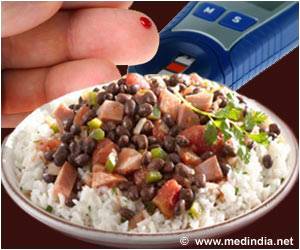A recent clinical trial shows that low-fat vegan diet is superior to a conventional diet in glycemic and lipid control of diabetic patients.

- Animal products are believed to be mainly linked to heart disease and insulin resistance.
- Vegan diet, which contains no animal products at all and is relatively low in saturated fats is reported to lower the levels of HbA1c.
- A vegan diet is recommended for type 2 diabetic patients for effective glycemic control.
It takes a lot of planning to chalk out an optimal diet for a diabetic to try and limit the amount of carbohydrate and keep the blood glucose levels in check. A well-balanced diet would tend to decrease the risk of diabetes in obese and pre-diabetic individuals. Few studies have demonstrated that diets high in meat and fatty foods could cause an increase in insulin resistance. A vegan diet does not include animal products and has been suggested to be clinically beneficial in effective diabetes management.
Study - Why Asians?
Asians are believed to consume more of plant-based items such as rice, vegetables and fruits as compared to people from Western countries. A randomized clinical trial (RCT) was conducted among the Asian population, particularly Korean patients with type 2 diabetes (T2D) to determine the effect of a vegan diet on glycemic control and other cardiovascular risk factors and compare its effect against conventional diabetic diet.Method
- The study group included participants with T2D between the ages of 30 to 70 years and were randomly divided into two groups.
- The experimental group included 46 participants. They were instructed to follow a vegan diet (avoiding all animal-based food including meat, fish and eggs). They were asked to include unpolished rice (brown rice) and avoid polished rice (white rice) as well as processed food in their diet. Low-glycemic index foods such as legumes and green vegetables were also allowed in their diet.
- The 47 participants in the control group were assigned a conventional diet recommended by the Korean Diabetes Association 2011 for 12 weeks.
- Participants were instructed to restrict their calorie intake based on their body weight and physical activity amongst other parameters.
- The participants were asked to maintain their normal level of physical activity and to continue their current medications.
- Physical examinations and laboratory measurements such as blood glucose, HbA1c levels, total cholesterol and triglycerides amongst others were measured at baseline and then at 4, and 12 weeks.
Results
- The primary study endpoint was considered as the change in HbA1c levels over 12 weeks.
- The mean HbA1c levels at 0, 4 and 12 weeks were reported to be 7.7%, 7.2% and 7.1% in the vegan group, and 7.4%, 7.2%, and 7.2% in the conventional group, respectively; thus both groups showed significant reductions in HbA1c levels, however the reductions were larger in the vegan group than in the conventional group
- When analyses were done participants with high compliance, the difference in HbA1c level reduction between the groups was found to be larger (-0.9% in vegan group vs. -0.3% in conventional group). The beneficial effect of vegan diets was noted even after adjusting for energy intake or waist circumference over the entire duration of the study.
- The average energy intake was reported to be 1,496 kcal/day in the vegan diet group and 1,559 kcal/day in the conventional diet group for the period of 12 weeks and the difference was reported to be significant.
- Compliance was reported to be better in the conventional diet group than in the vegan diet group.
- Significant reduction in body mass index (BMI) and waist circumference were seen only in the vegan diet group. However, there were no significant differences in the changes in systolic blood pressure (SBP), diastolic blood pressure (DBP), low density lipoprotein (LDL)-cholesterol level and high density lipoprotein (HDL)-cholesterol level in both the groups.
- Vegan diets may offer health benefits associated with cardiovascular risk factors such as serum lipids and blood pressure as compared to other omnivorous diets (diets that include both plant and animal-based foods).
Conclusions
- Even though both diets led to reductions in HbA1c levels, vegan diet was found to be more effective for glycemic control for type 2 diabetic patients when compared to conventional diabetes diet.
- Since the compliance factor was relatively lower in the vegan diet group as compared to the conventional group, the authors feel that it is not realistic to recommend vegan diets to all T2D patients.
- The dietary guidelines for patients with T2D should include a vegan diet for the better management and treatment, especially for those patients who are strongly motivated to follow a vegan diet.
Limitations
- The duration of the study was only for 12 weeks. Hence further studies are needed to evaluate the long-term effects of vegan diet on glycemic control.
- This study mainly used telephone consultations as opposed to some other intensive approaches like weekly or biweekly group meetings used by previously conducted trials on diet intervention. This could be one of the reasons for poor compliance.
- Most of the study participants were women since men were difficult to recruit. There is a high possibility that effects of vegan diet could differ according to gender.
- The study did not conclusively prove whether the improvement in glycemic control through vegan diets would lead to a reduction in the risks of macro- or microvascular complications of diabetes.
- Effect of a Brown Rice Based Vegan Diet and Conventional Diabetic Diet on Glycemic Control of Patients with Type 2 Diabetes: A 12-Week Randomized Clinical Trial - (http://journals.plos.org/plosone/article?id=10.1371%2Fjournal.pone.0155918)















